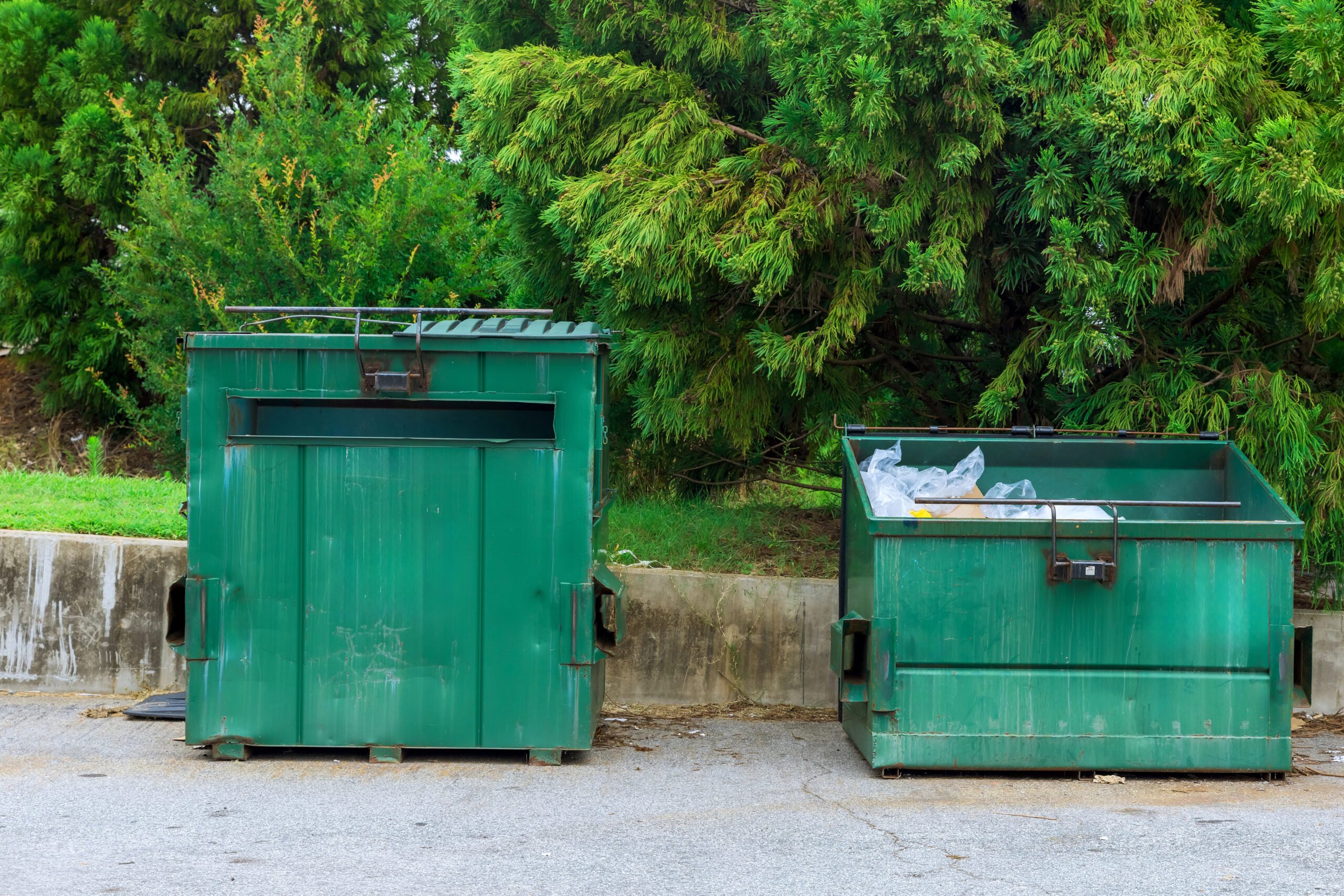Throwing medical waste in dumpsters poses serious health, environmental, and legal risks. Learn what qualifies as medical waste, why it cannot go into regular trash, and safe disposal alternatives.

Disclaimer: this post may contain affiliate links, and every purchase made through these links will give me a small commission (at absolutely no extra cost for you!) AS AN AMAZON ASSOCIATE AND REWARDSTYLE MEMBER, I EARN FROM QUALIFYING PURCHASES. See Privacy Policy for additional info.
Throwing medical waste in a rental dumpster can create serious risks. The World Health Organization mentions that about 15 percent of healthcare waste is hazardous, including infectious or toxic materials (WHO). When this waste enters ordinary trash systems, the dangers extend to the environment. Items like needles, bandages, and expired medications can expose workers and communities to infections and toxins.
In this article, we will learn what qualifies as medical waste, why regular dumpsters are unsafe for it, the environmental and legal aspects, safer disposal options, and the reasons proper medical waste disposal is necessary.
What Counts as Medical Waste
Medical waste covers different types of waste substances. These materials possess risks and need proper handling so they do not cause any harm to the environment.
Infectious Waste
This includes materials contaminated with blood, body fluids, or other substances that may have disease-carrying pathogens. Used dressings, swabs, and laboratory cultures all fall into this category of medical waste. If thrown into regular trash, these items can transmit diseases to sanitation workers or anyone who comes into contact with them.
Sharps Waste
Sharps are one of the most recognized hazards. Needles, scalpels, or even broken glass from laboratories can puncture skin and spread infections. The CDC estimates hundreds of thousands of needle-stick injuries occur each year among health-care workers, showing why sharps must never end up in unprotected dumpsters.
Pathological Waste
Pathological waste includes tissues, organs, and body parts removed during surgery, as well as animal remains from laboratories. These materials can carry infectious agents and cannot be mixed with standard trash. Handling usually involves incineration or other high-control methods that neutralize risk before final disposal.
Pharmaceutical Waste
Pharmaceutical waste includes medications that are expired or unused, as well as contaminated containers. When thrown away in the regular dumpster, they can contaminate the soil where it is discarded.
Radioactive Waste
Radioactive waste comes from radiation therapy and some laboratory work. When they are released into the environment, even in small amounts, they pose long-term risks. Safe management requires licensed facilities with shielding and monitoring systems, making it completely unsuitable for regular disposal routes.
Why Medical Waste Cannot Go into Regular Dumpsters
Putting medical waste into ordinary dumpsters poses serious harm. These bins are not built for infectious or hazardous materials, so the risk multiplies when the medical waste is mixed in.
Risks to Sanitation Workers
Sanitation workers often handle bags and bins without being aware of the contents. If sharps or contaminated waste are in there, they may suffer cuts or punctures. These injuries can transmit diseases like HIV, hepatitis B, hepatitis C, etc. The US EPA reports risks escalate when needles break open inside garbage trucks or when sharp containers are not used.
Risks to the Community
Medical waste that leaks or disperses from dumpsters can expose people. Animals or children may pick at disposed items. Pathogens may spread. WHO data shows that healthcare waste contains infectious and toxic material that threatens both health workers and the general public.
Risks to the Waste System
Ordinary waste facilities lack the tools to neutralize or safely treat hazardous medical waste. Incineration, autoclaving, or other controlled treatments are needed for infectious or chemical waste. If medical waste enters a dumpsite or is handled as regular trash, pathogens may spread in the environment. Incomplete treatment of medical waste causes toxic pollutants to be released, according to the WHO.
Environmental Consequences of Improper Disposal
When medical waste is disposed of in a regular dumpster, the damage persists long after pickup. Once it enters landfills or uncontrolled burn sites, it leaves lasting effects on the surroundings.
Water Contamination
Landfills that receive mixed waste often produce runoff called leachate. Suppose medical waste is part of that stream. In that case, it can carry diseases and chemicals into the wells and nearby rivers, creating a massive risk for drinking water supplies and communities downstream.
Soil Pollution and Wildlife Harm
Medical waste from discarded drugs, disinfectants, or laboratory chemicals can bind with the soil and alter its quality. Wildlife that comes into contact with contaminated materials can suffer poisoning, infections, or injury from sharp objects. A WHO report reveals that the mismanaged segregation of waste increases the risk of environmental contamination in areas where open dumping persists.
Air Pollution
When medical waste is burned in open fires or incinerated without taking proper measures, it releases toxic pollutants such as dioxins and furans. Chemicals in medical waste can harm the environment, ultimately affecting human health. The US EPA emphasizes that controlled, high-temperature incineration is necessary to reduce emissions, a capability that regular waste disposal facilities cannot provide.
Legal and Financial Consequences
Anyone who generates medical waste is legally responsible for disposing of it in a safe manner. Dumping medical waste in the trash is a violation of the law.
Federal and State Laws
States set their own rules for medical waste. These rules include information about what you can store, how long you can keep it, and who is allowed to pick it up. Most of them follow federal standards, but the details vary. If you run a clinic or a facility, you are expected to know the rules of your area regarding medical waste disposal and follow them without exception.
Fines and Penalties
If regulators find medical waste in the wrong place, the fines can be serious. Some businesses have paid thousands for putting sharps into general trash bins. Repeated violations cost more. And, legal action may be taken if someone is injured.
Liability for Businesses
Even after the trash is hauled away, the business that produced the waste is still responsible. If it shows up where it should not be, the source can be tracked. This indicates a potential risk of mishandling waste, with possible legal consequences.
Safe Alternatives for Medical Waste Disposal
You do not need to guess how to handle medical waste. There are clear options that are legal, safe, and built for the job.
Professional Medical Waste Services
Medical waste companies collect the waste, follow the specified steps of disposal, and dispose of it at approved sites. This helps clinics and labs avoid problems with storage, transport, or recordkeeping.
Dumpster Rental with Restrictions
Some waste companies offer dumpster services that accept limited medical waste. The waste must be packed in a certain way and clearly labeled. Not every provider allows this, so you need to ask before booking.
Local Drop-Off and Take-Back Programs
Some pharmacies and hospitals accept small amounts of medical waste. That includes used needles or expired pills. Cities sometimes offer drop-off days or permanent bins. If you only have a little to throw out, this is one of the simplest options.
How Businesses and Households Can Stay Compliant
Rules are different depending on where you live, but the basics are the same. Keep medical waste separate, use the right containers, and work with a licensed service.
If you run a clinic, train your team so no one guesses what goes where. Keep records of pickups. If you are managing it at home, ask your local pharmacy or city office where to bring used needles or medicine. Following these steps lowers risk. It also keeps you out of trouble if someone checks.
Final Thoughts
Medical waste does not fall in the same category as regular trash. If you throw it in the wrong place, many can be affected. Look into disposal options and use a proper pickup service that can dispose of medical waste safely and compliantly. Use a drop-off site to make sure that you dump in the correct space. Doing it the right way is not complicated, and it matters.








Leave a Reply